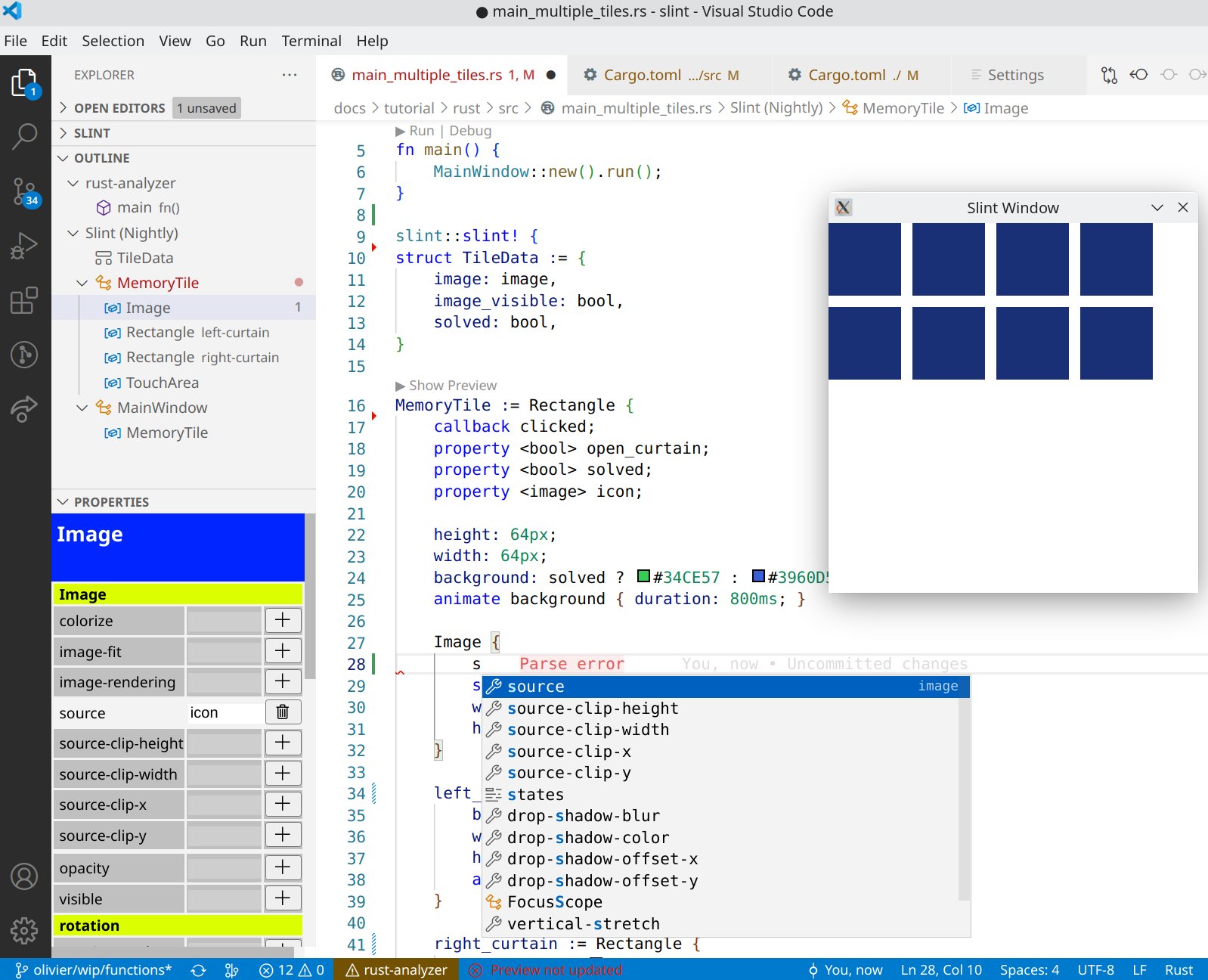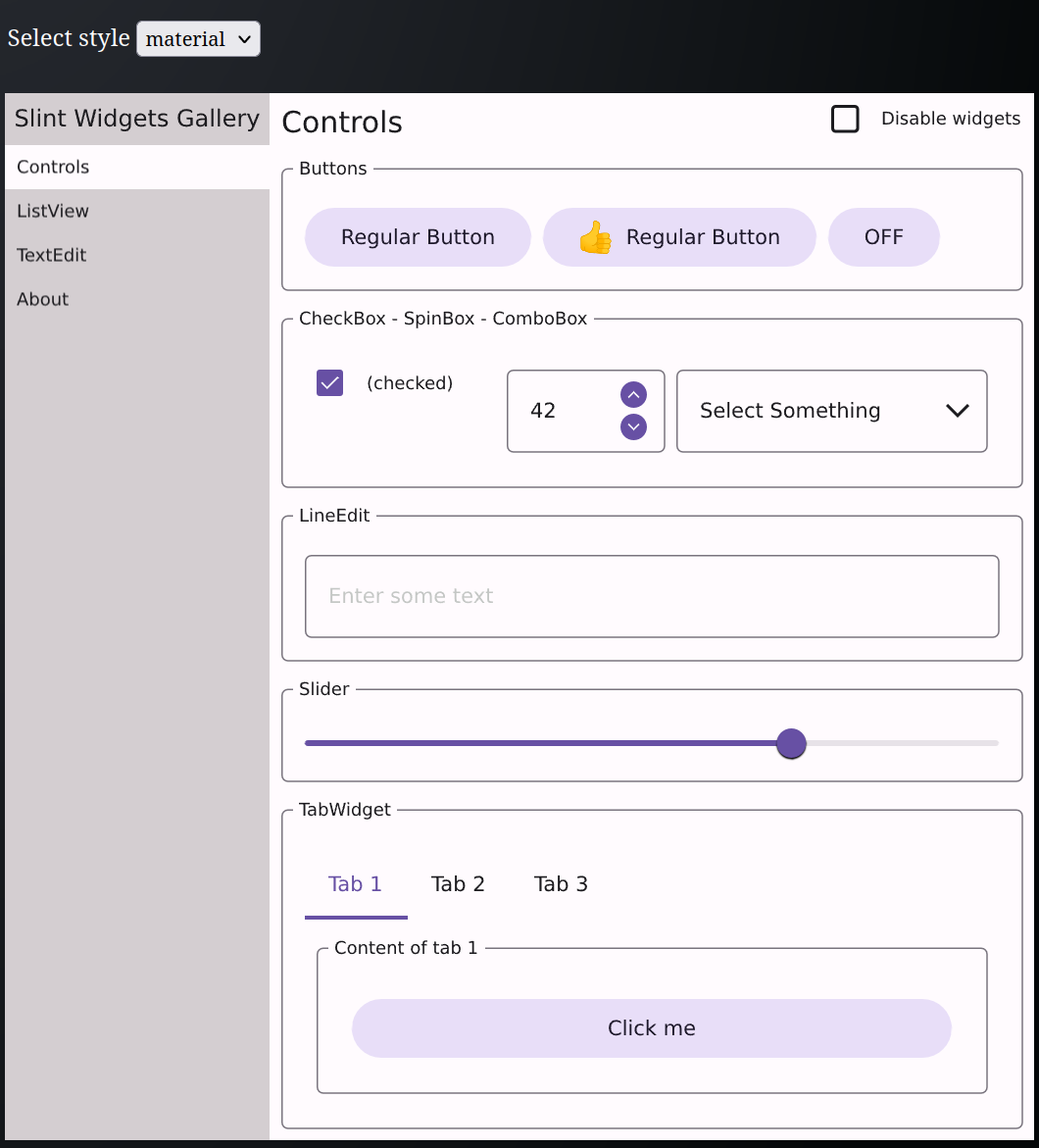December 22, 2022 by Tobias Hunger
2022: Slint in Review 
This year was eventful and interesting for us at Slint. In this blog post, we'd like to go through our highlights of 2022 🚀.
The Business
In February, we renamed the project and product from SixtyFPS to Slint. We introduced a new logo, defined our branding guidelines, and launched a new website.
One of the many proud moments for us was when Slint was recognized as one of the fastest-growing OSS startups with an annual growth rate of 470%! Our heartfelt gratitude to our community who made this happen. THANK YOU, and we expect to grow even faster in the next year.
Our free-of-charge proprietary license, is starting to gain traction: We now have 15 Ambassadors who are building their projects using this free license. We offer this license so that Slint can be used in projects where our FLOSS license (GPLv3) is not a good match.
With the easing of pandemic related restrictions, we were able to take part in our first trade show: Embedded World Exhibition and Conference, where we showcased the power of Slint on various embedded devices, including the very low powered Raspberry Pi Pico.
As the year progressed, we started receiving business interest from within Europe and Asia. To support our customers locally, we've established a partnership program with several design and service companies. All of our valued partners are listed here.
Finally, our highlight of the year was securing funding to continue development of the project and the business. We expanded our team, growing to 5 people by October:
- Tobias Hunger joined the team in January as a developer, to work on tooling and accessibility.
- Lukas Jung joined in March as our intern, and did some amazing work, including the 7guis demos.
- Aurindam Jana joined in July, to develop the business.
- Florian Blasius joined in October as a developer. He has since improved the visual appearance of our demos and styles.
The Community
In February,
we were excited when Olivier's document-features crate made it to
crate of the week.
We share a strong understanding of the value of free software, open source projects, and the communities around them. It's important for us to be part of the wider Rust ecosystem, by providing our own crates and contributing to crates that we depend on. Therefore, in March, joining the Rust Foundation as a Silver member came as a natural step for us, and we look forward to engaging with the community as part of the foundation.
Slint is a free software project. Our goal is to build a healthy community around Slint, where we share ideas and experiences, welcome contributions; a place where we're all learning constantly from each other. As part of this goal:
- Simon presented Slint at the Berlin Rust and Tell event back in April.
- Tobias and Florian attended the EuroRust 2022 conference, where Tobias presented Rust and C++ interoperability. They greatly enjoyed meeting so many Rustaceans in person at the event!
We'll continue to be part of community events, please give us a shout-out if you hear of anything interesting.
We're happy to see the adoption of Slint in open source projects grow this year:
- The image-sieve project was an early adopter back in February.
- Florian made amazing progress porting Slint to Redox OS. Some utilities are already based on Slint.
-
PopOS will work with us to enable Slint as an alternative toolkit for
developers.
A great start to the week - @pop_os_official will collaborate with us to offer Slint as an alternative toolkit for application development on Cosmic Desktop.#rustlang
— Slint (@slint_ui) December 5, 2022
Last but not least, thanks to everyone who contributed high-quality bug reports and patches ❤️.
The technical Side
We were the first Rust based UI toolkit to announce cross-platform accessibility support, using Qt to handle the OS abstraction for us.
In the first half of the year, we concentrated our efforts on micro controller (MCU) support. This was demonstrated at Embedded World and culminated in the 0.3.0 release in September, which included all the public APIs needed to integrate Slint with an MCU.
The second half of 2022, we worked on making the Slint UI description language more expressive and easier to maintain. Olivier wrote two blog posts about this work (Part 1, Part 2). We incorporated feedback from the community into the final design, and parts of this shipped in the latest 0.3.3 release, a few days ago.
We've come a long way with tooling: Our language server has seen much polish and was extended with custom commands to add and remove property bindings from elements. Both the online editor as well as our VS Code extension make good use of this new functionality.

We also improved our widget styles and added a brand new material design style.

Statistics
Let's look at some numbers 📊:
More than 35 contributors made over 2500 commits in our Github repository. A big thank you to all of you. We published 11 releases altogether.
We're happy to see the growth of our community also reflected in an increasing number of ⭐️ GitHub stars, doubling from about 2500 to more than 5000 this year.
Acknowledgments
First, we'd like to thank our users, contributors, and customers. We've had many lovely interactions on issues that you filed, discussions that you started, and wonderful patches that you've contributed. We appreciate all of your feedback, criticism, and words of encouragement.
What's next?
Next year, we're heading towards Slint 1.0, and we want to implement more features like translations, table views, and video support. We're also planning to take the first steps towards a visual design tool for Slint files.
Now we're taking a few days off to relax, take a breath, and recharge our batteries, before we start into 2023! 🎄🚀 See you all on the other side.
Slint is a Rust-based toolkit for creating reactive and fluent user interfaces across a range of targets, from embedded devices with limited resources to powerful mobile devices and desktop machines. Supporting Android, Windows, Mac, Linux, and bare-metal systems, Slint features an easy-to-learn domain-specific language (DSL) that compiles into native code, optimizing for the target device's capabilities. It facilitates collaboration between designers and developers on shared projects and supports business logic development in Rust, C++, JavaScript, or Python.